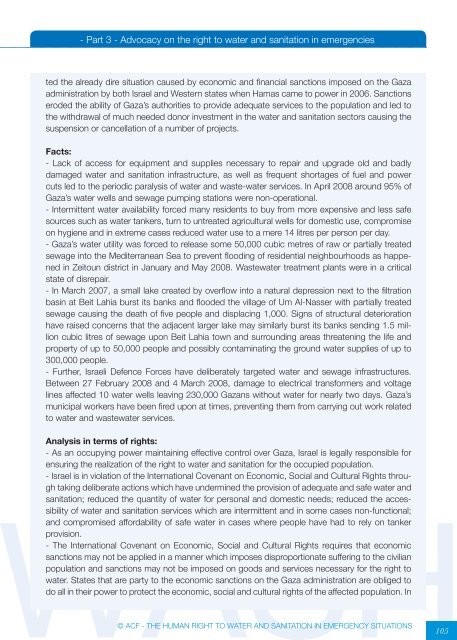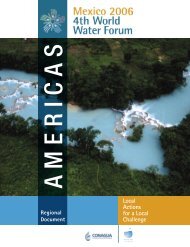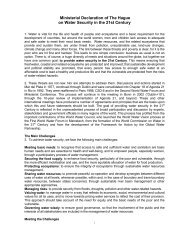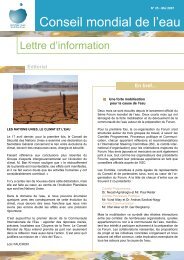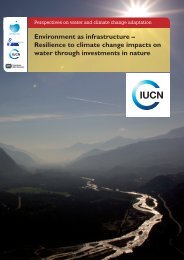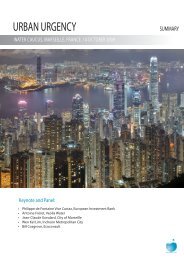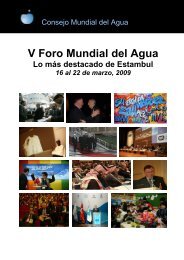the human right to water and sanitation in emergency situations
the human right to water and sanitation in emergency situations
the human right to water and sanitation in emergency situations
Create successful ePaper yourself
Turn your PDF publications into a flip-book with our unique Google optimized e-Paper software.
- Part 3 - Advocacy on <strong>the</strong> <strong>right</strong> <strong>to</strong> <strong>water</strong> <strong>and</strong> <strong>sanitation</strong> <strong>in</strong> emergencies<br />
ted <strong>the</strong> already dire situation caused by economic <strong>and</strong> f<strong>in</strong>ancial sanctions imposed on <strong>the</strong> Gaza<br />
adm<strong>in</strong>istration by both Israel <strong>and</strong> Western states when Hamas came <strong>to</strong> power <strong>in</strong> 2006. Sanctions<br />
eroded <strong>the</strong> ability of Gaza’s authorities <strong>to</strong> provide adequate services <strong>to</strong> <strong>the</strong> population <strong>and</strong> led <strong>to</strong><br />
<strong>the</strong> withdrawal of much needed donor <strong>in</strong>vestment <strong>in</strong> <strong>the</strong> <strong>water</strong> <strong>and</strong> <strong>sanitation</strong> sec<strong>to</strong>rs caus<strong>in</strong>g <strong>the</strong><br />
suspension or cancellation of a number of projects.<br />
Facts:<br />
- Lack of access for equipment <strong>and</strong> supplies necessary <strong>to</strong> repair <strong>and</strong> upgrade old <strong>and</strong> badly<br />
damaged <strong>water</strong> <strong>and</strong> <strong>sanitation</strong> <strong>in</strong>frastructure, as well as frequent shortages of fuel <strong>and</strong> power<br />
cuts led <strong>to</strong> <strong>the</strong> periodic paralysis of <strong>water</strong> <strong>and</strong> waste-<strong>water</strong> services. In April 2008 around 95% of<br />
Gaza’s <strong>water</strong> wells <strong>and</strong> sewage pump<strong>in</strong>g stations were non-operational.<br />
- Intermittent <strong>water</strong> availability forced many residents <strong>to</strong> buy from more expensive <strong>and</strong> less safe<br />
sources such as <strong>water</strong> tankers, turn <strong>to</strong> untreated agricultural wells for domestic use, compromise<br />
on hygiene <strong>and</strong> <strong>in</strong> extreme cases reduced <strong>water</strong> use <strong>to</strong> a mere 14 litres per person per day.<br />
- Gaza’s <strong>water</strong> utility was forced <strong>to</strong> release some 50,000 cubic metres of raw or partially treated<br />
sewage <strong>in</strong><strong>to</strong> <strong>the</strong> Mediterranean Sea <strong>to</strong> prevent flood<strong>in</strong>g of residential neighbourhoods as happened<br />
<strong>in</strong> Zei<strong>to</strong>un district <strong>in</strong> January <strong>and</strong> May 2008. Waste<strong>water</strong> treatment plants were <strong>in</strong> a critical<br />
state of disrepair.<br />
- In March 2007, a small lake created by overflow <strong>in</strong><strong>to</strong> a natural depression next <strong>to</strong> <strong>the</strong> filtration<br />
bas<strong>in</strong> at Beit Lahia burst its banks <strong>and</strong> flooded <strong>the</strong> village of Um Al-Nasser with partially treated<br />
sewage caus<strong>in</strong>g <strong>the</strong> death of five people <strong>and</strong> displac<strong>in</strong>g 1,000. Signs of structural deterioration<br />
have raised concerns that <strong>the</strong> adjacent larger lake may similarly burst its banks send<strong>in</strong>g 1.5 million<br />
cubic litres of sewage upon Beit Lahia <strong>to</strong>wn <strong>and</strong> surround<strong>in</strong>g areas threaten<strong>in</strong>g <strong>the</strong> life <strong>and</strong><br />
property of up <strong>to</strong> 50,000 people <strong>and</strong> possibly contam<strong>in</strong>at<strong>in</strong>g <strong>the</strong> ground <strong>water</strong> supplies of up <strong>to</strong><br />
300,000 people.<br />
- Fur<strong>the</strong>r, Israeli Defence Forces have deliberately targeted <strong>water</strong> <strong>and</strong> sewage <strong>in</strong>frastructures.<br />
Between 27 February 2008 <strong>and</strong> 4 March 2008, damage <strong>to</strong> electrical transformers <strong>and</strong> voltage<br />
l<strong>in</strong>es affected 10 <strong>water</strong> wells leav<strong>in</strong>g 230,000 Gazans without <strong>water</strong> for nearly two days. Gaza’s<br />
municipal workers have been fired upon at times, prevent<strong>in</strong>g <strong>the</strong>m from carry<strong>in</strong>g out work related<br />
<strong>to</strong> <strong>water</strong> <strong>and</strong> waste<strong>water</strong> services.<br />
Analysis <strong>in</strong> terms of <strong>right</strong>s:<br />
- As an occupy<strong>in</strong>g power ma<strong>in</strong>ta<strong>in</strong><strong>in</strong>g effective control over Gaza, Israel is legally responsible for<br />
ensur<strong>in</strong>g <strong>the</strong> realization of <strong>the</strong> <strong>right</strong> <strong>to</strong> <strong>water</strong> <strong>and</strong> <strong>sanitation</strong> for <strong>the</strong> occupied population.<br />
- Israel is <strong>in</strong> violation of <strong>the</strong> International Covenant on Economic, Social <strong>and</strong> Cultural Rights through<br />
tak<strong>in</strong>g deliberate actions which have underm<strong>in</strong>ed <strong>the</strong> provision of adequate <strong>and</strong> safe <strong>water</strong> <strong>and</strong><br />
<strong>sanitation</strong>; reduced <strong>the</strong> quantity of <strong>water</strong> for personal <strong>and</strong> domestic needs; reduced <strong>the</strong> accessibility<br />
of <strong>water</strong> <strong>and</strong> <strong>sanitation</strong> services which are <strong>in</strong>termittent <strong>and</strong> <strong>in</strong> some cases non-functional;<br />
<strong>and</strong> compromised affordability of safe <strong>water</strong> <strong>in</strong> cases where people have had <strong>to</strong> rely on tanker<br />
provision.<br />
- The International Covenant on Economic, Social <strong>and</strong> Cultural Rights requires that economic<br />
sanctions may not be applied <strong>in</strong> a manner which imposes disproportionate suffer<strong>in</strong>g <strong>to</strong> <strong>the</strong> civilian<br />
population <strong>and</strong> sanctions may not be imposed on goods <strong>and</strong> services necessary for <strong>the</strong> <strong>right</strong> <strong>to</strong><br />
<strong>water</strong>. States that are party <strong>to</strong> <strong>the</strong> economic sanctions on <strong>the</strong> Gaza adm<strong>in</strong>istration are obliged <strong>to</strong><br />
do all <strong>in</strong> <strong>the</strong>ir power <strong>to</strong> protect <strong>the</strong> economic, social <strong>and</strong> cultural <strong>right</strong>s of <strong>the</strong> affected population. In<br />
© ACF - THE HUMAN RIGHT TO WATER AND SANITATION IN EMERGENCY SITUATIONS<br />
105


